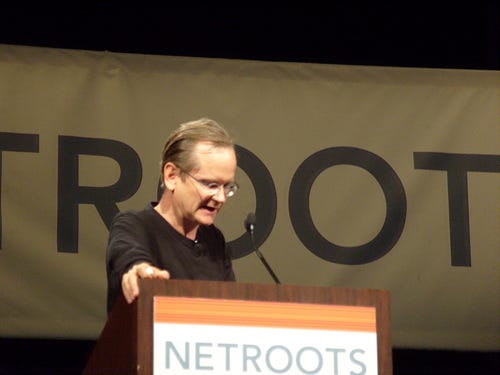Former White House counsel: Lessig underestimates collateral damage from Stark 360 partnership

Bob Bauer, former White House counsel to Pres. Obama, notes the single-issue approach to campaign finance reform practiced by Prof. Lawrence Lessig and Mayday.US comes at a considerable cost in means and ends:
It relies on money to achieve its goal; it insists that all other policy objectives should be subordinated to it; and it aims to be the decisive factor in the election of candidates who have tacked campaign finance reform onto platforms consisting of the repeal of health care reform, opposition to comprehensive immigration reform, support for NRA gun rights policies, and serious discussion of impeachment as a means of expressing opposition to the policies of the current administration.
The man Lessig calls “one of the truly great lawyers of our time” says it is fair for progressives – the natural constituency for Lessig’s scheme to reform campaign finance – to ask how much collateral damage is acceptable. Bauer points to Mayday’s New Hampshire partnership with Stark 360, a group with links to the Free State Project, as a case in point. Lessig “underestimates the burden he carries to establish for progressives that the means are well fitted to his ends,” writes Bauer:
In the case of Stark360, Prof. Lessig assigns little significance to the longer-term consequences of aligning Mayday with this organization. For one thing, he has lent it credibility or at least brought to it national attention—not many outside of New Hampshire had heard of it, until Mayday joined forces with it. Stark360 can transfer this fresh political capital to other initiatives progressives energetically oppose. This is politics, after all, and Professor Lessig and Mayday have helped to promote Stark360 overall.
Moreover, it will be little solace to progressives that Stark360, like Mayday, supported Jim Rubens for the United States Senate in New Hampshire. It supported Rubens for entirely different reasons and utterly opposed electing him for the reason motivating Mayday. So if Rubens had been elected, to whom in this alliance would he have owed his allegiance—the organization in the coalition that wants public financing reform, or the one very much against it? It seems this is quite a muddled politics that can only send the candidate Mayday is supporting a mixed message about what level of obligation he actually carries into office as a campaign finance supporter.


